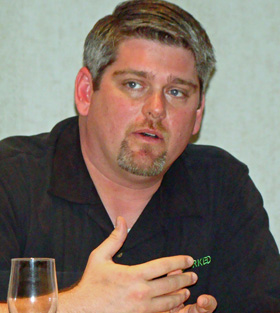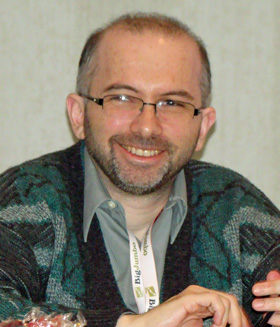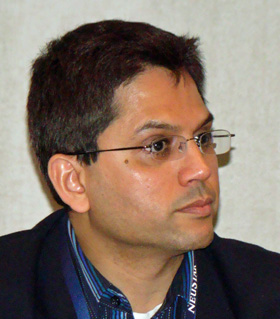|
Domain Name
Investments in 2009 and Beyond
|
The
final seminar of the Domainer Mardi Gras conference
that was held in New Orleans Feb. 19-21 focused on
a topic of special interest to domain portfolio owners and
those thinking about entering this business - that being
the outlook for domain name investing in 2009 and
beyond. Though we touched on this discussion in our show
review article, the broad scope of that piece
did not allow us to go into detail about what was said in
individual sessions like this one.
Since
this is a subject that we think virtually all of our
readers are interested in, we thought it would be a good
idea to use this month's newsletter to pass along some of
the panelist's comments in the domain investing
session. Before
investing in anything you first have to ask yourself
"is this an area that I should be investing in at
all?" The first panelist to speak, Parked.com
President Donny Simonton, addressed that,
noting that while the collapse
|

Donny
Simonton
President,
Parked.com
|
|
in the general economy has
affected almost everyone, domains have been more resilient
than other classes of assets. A primary reason for that is
the ability of good domain names to produce revenue in
multiple ways.
|
|
"We've
seen about a 20% downturn in our business (domain name
parking), but a lot of other businesses out there have dropped
much more than that," Simonton said.
"Also, understand that just because your revenue goes
down 20%, that doesn't mean you can't offset that by, for
example, adding 10% to your customer base and making
landing page improvements that lead to a 10% improvement
in click through."
|
Sedo
VP of Product Management, Sam Nunez, said
that is also true of the aftermarket side of the
equation. "While we have seen a decrease at
the high end of the market, that has been
offset by an increase at the low end. Our
volume of sales for the first two months of this
year was actually better than it was for the same
time frame last year," Nunez noted. With
domains, you also have the option of undertaking
full scale development - a strategy that
can produce a quantum leap in income if it
is done right. However, Simonton cautioned that
developing successful sites is easier said than
done. "Make sure that if you are going to
develop something you know exactly what you are
going to do. You have to put everything
behind it." Because
total focus is needed to build a site that stands
out from the pack, Simonton observed "You
really don't run into too many companies that have
hundreds of sites that |

Sedo
VP Sam Nunez |
| are
built out. Even very successful developers like
the Internet
Real Estate Group only have about ten
sites built out at once. But when they build them,
they build them really really well,"
Simonton said. |
"That's
the most important thing. If you do it - make sure you do
it right. Make sure you have the money and the time
to see it through. It might take six months to two years
before you make a single penny," Simonton
added.
|
In
a session about Diversification that
proceeded this one, noted domain investor Rick
Latona said that he was investing
heavily in country code domains. In fact
Latona's company will stage a T.R.A.F.F.I.C.
conference devoted entirely to
ccTLDs June 1-4 in Amsterdam, Holland.
One of the panelists in the domain investing
seminar that followed (the one we are focusing on
in |
|

Ivor
Sequeira
Senior Director, Neustar |
this
article) was Ivor Sequeira, a Senior
Director from Neustar, the company that
operates the .US registry (America's
country code).
Since .com
still overshadows .US in America, Latona has not
been a big fan of the extension, but Sequeira said
Neustar was ready to start spending money to raise
the profile of .US (as well as .biz, a
global TLD that Neustar also administers).
Sequeira said
that .US fell behind in the race for mind share
because the ccTLD had been reserved for government
use until the spring of 2002. By the time it was
finally opened up to the general public, .com had
become the default extension for most Americans.
Many current .US
portfolio holders think the brand is a natural
with great potential, but believe that the
registry has let it wither on the vine for the
past seven years. "I know there has been some
criticism that we have |
| not
done a lot of promotion or advertising to make .US
more visible, but doing that will be a major
priority for us in 2009," Sequeira said.
"One of the main reasons I am at this
conference is to build awareness for .US and .biz
and this year I think you will see that we
continually have things out in the marketplace for
both brands." |
|
| "We
did a survey that showed that people really like
the .US brand but they have some reservations
because they just don't see it a lot,"
Sequeira said. "We learned that we have to
work with registrars and resellers to the end user
market to build visibility for the .US
brand."
We will be doing
more advertising and are also looking at an incentive
program aimed at end users. If they register
or buy a .US domain for their site we would reward
them with some sort of incentive that hasn't been
settled on yet. We as a company are willing to
spend some money and we are willing to partner
with people to do what it takes to build the
space."
Sedo is the
dominant aftermarket in the ccTLD space and taken
as a whole, Sam Nunez said country codes are
steadily whittling away at .com's dominant
position. Nunez said "In 2007 .com accounted
for 60% of our sales. Last year that
slipped to 58% with most of the 2% decline
going to ccTLDs." However Nunez |

|
| acknowledged
that .com is still the world's most powerful
brand. He said that when you consider where to
invest in 2009 you should recognize that there are
now some great opportunities to get solid .com
domains at bargain prices. "Now
is the time to buy," Nunez concluded. |
*****
|
|
|

